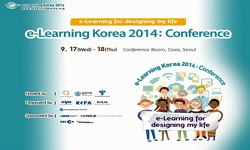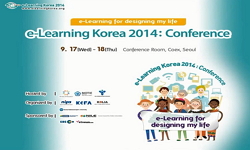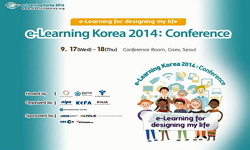As the development of e-learning technology has shifted educational paradigm, the innovative teaching and learning methodology using social e-learning software has been suggested. Technology-assisted instruction supports self-regulated learning, enabl...
http://chineseinput.net/에서 pinyin(병음)방식으로 중국어를 변환할 수 있습니다.
변환된 중국어를 복사하여 사용하시면 됩니다.
- 中文 을 입력하시려면 zhongwen을 입력하시고 space를누르시면됩니다.
- 北京 을 입력하시려면 beijing을 입력하시고 space를 누르시면 됩니다.
부가정보
다국어 초록 (Multilingual Abstract)
As the development of e-learning technology has shifted educational paradigm, the innovative teaching and learning methodology using social e-learning software has been suggested. Technology-assisted instruction supports self-regulated learning, enabling learners to engage in interactive class activities. Among the social e-learning software, Moodle, known for its many interactive and social features, has been implemented as an instruction and learning system at the university level. Nevertheless, it has not been investigated yet how the Moodle system is being effectively utilized to support self-regulated learning. So this study aims to examine how the Moodle system functions to support interactive and self-regulated learning for pre-service English teachers on the basis of their feedback about the Moodle-based activities In addition, the analysis was also conducted to find out which features of Moodle reflect constructivist pedagogy. The result of the study shows that Moodle-assisted instruction benefited students to have more chances to interact with their peers and their instructor. It was also found that the versatile features of the system have a lot of potential to be utilized effectively as a supplementary tool for language learning. It is recommended that for optimal outcome from Moodle-based course, students’ positive attitudes toward technology-based instruction and robust technological environments for operating the system should be set.
참고문헌 (Reference)
1 강혜순, "파워포인트 슬라이드 제작 및 활용을 통한 영어 협동 학습 방안 연구" 영상영어교육학회 11 (11): 201-223, 2010
2 김정태, "이러닝 영어교육: 무들 활용 영어교육 사례" 한국지식정보기술학회 5 (5): 21-27, 2010
3 최원경, "무들의 협력학습 및 자기주도적 언어학습경험에 대한 연구" 신영어영문학회 42 (42): 247-268, 2009
4 이동한, "메신저를 활용한 초등영어 쓰기 학습모듈 개발 및 수업 적용 방안 연구" 영상영어교육학회 12 (12): 195-217, 2011
5 김미라, "기술·가정과 ‘정보 통신 기술의 활용’ 단원에서 무들을 이용한 자기 주도 학습 모형 개발" 한국기술교육학회 11 (11): 169-188, 2011
6 Foley, B., "Wiki as professional development tool"
7 Ruiperez, G., "Web assisted language learning and learning management systems virtual centers for foreign languages" 2 (2): 81-95, 2002
8 Cole, J., "Using Moodle: Teaching with the popular open source course management system" O’Reilly Community Press 2005
9 Proietta, M., "Using Moodle to integrate a foreign language course in secondary school"
10 Dougiamas, M., "Using Moodle in ESOL writing classes"
1 강혜순, "파워포인트 슬라이드 제작 및 활용을 통한 영어 협동 학습 방안 연구" 영상영어교육학회 11 (11): 201-223, 2010
2 김정태, "이러닝 영어교육: 무들 활용 영어교육 사례" 한국지식정보기술학회 5 (5): 21-27, 2010
3 최원경, "무들의 협력학습 및 자기주도적 언어학습경험에 대한 연구" 신영어영문학회 42 (42): 247-268, 2009
4 이동한, "메신저를 활용한 초등영어 쓰기 학습모듈 개발 및 수업 적용 방안 연구" 영상영어교육학회 12 (12): 195-217, 2011
5 김미라, "기술·가정과 ‘정보 통신 기술의 활용’ 단원에서 무들을 이용한 자기 주도 학습 모형 개발" 한국기술교육학회 11 (11): 169-188, 2011
6 Foley, B., "Wiki as professional development tool"
7 Ruiperez, G., "Web assisted language learning and learning management systems virtual centers for foreign languages" 2 (2): 81-95, 2002
8 Cole, J., "Using Moodle: Teaching with the popular open source course management system" O’Reilly Community Press 2005
9 Proietta, M., "Using Moodle to integrate a foreign language course in secondary school"
10 Dougiamas, M., "Using Moodle in ESOL writing classes"
11 Baskerville, B., "Using Moodle for teaching business English in a CALL environment" 1 (1): 138-151, 2005
12 Lu, J., "Understanding collaborative learning behavior from Moodle log data" 20 (20): 451-466, 2012
13 Suppasetseree, S., "The use of Moodle for teaching and learning English at tertiary level in Thailand" 8 (8): 29-41, 2010
14 Boyd, D., "The significance of social software, In Blog Talks reloaded: Social software research & cases" Books on Demand 15-30, 2007
15 Olson, V. L. B., "The revising process of sixth-grade writers with and without peer feedback" 84 : 22-29, 1990
16 Jingwei, T., "The research on blended learning of ESL based on Moodle Platform" 6 (6): 30-34, 2013
17 Piaget, J., "The psychology of the child" Basic Books 1972
18 Al-Jaf, R., "The effect of on line grammar instruction on low proficiency EFL college students’ achievements" 7 (7): 166-190, 2005
19 Wu, W., "The application of Moodle on an EFL collegiate writing environment" 7 : 45-56, 2008
20 Yamen, S., "Technology supported learning platform : Moodle integrated academic course" 2 (2): 146-160, 2010
21 Wood, S. L., "Technology for teaching and learning : Moodle as a tool for higher education" 22 (22): 299-307, 2010
22 Lee, M. J., "Social software as tools for pedagogical transformation: Enabling personalization, creative production, and participatory learning, In Educational social software for context-aware learning" IGI Global 1-22, 2010
23 Owen, M., "Social software and learning" 1 : 1-36, 2006
24 박명수, "Preliminary Report on How Videoconferencing is Used for Korean EFL Learners" 영상영어교육학회 13 (13): 149-168, 2012
25 "Multimedia Super Corridor"
26 Rice, W. H., "Moodle teaching techniques : Creative ways to use Moodle for constructing online learning solutions" Packt 2007
27 Maikish, A., "Moodle : A free easy and constructive online learning tool" 13 (13): 26-28, 2006
28 Stanford, J., "Moodle 1.9 for second language learning" Packet 2009
29 Vygotsky, L., "Mind in and Society" Harvard University Press 1978
30 Fischer, G., "Innovative Media in Support of Distributed Intelligence and Lifelong Learning" IEEE Computer Society 3-10, 2005
31 Pieri, M., "From e-learning to mobile learning: new opportunities, In Mobile learning: Transforming the delivery of education & training" Athabasca University 183-194, 2009
32 Hodson, D., "From constructivism to social constructivism : a Vygotskian perspective on teaching and learning science" 79 (79): 33-41, 1998
33 Chung-Hsien, L., "Enrichment of peer assessment with agent negotiation" 4 (4): 35-46, 2011
34 Murphy, E., "Constructivism: From philosophy to practice"
35 Minocha, S., "Collaborative learning in a wiki environment : experiences from software engineering course" 13 (13): 187-209, 2007
36 Brandl, K., "Are you ready to Moodle?" 9 (9): 16-23, 2005
동일학술지(권/호) 다른 논문
-
Using Video in the English Literature Classroom:Literary Analysis, Theology, Cain, and Kung Fu
- 영상영어교육학회
- KIM KITAI
- 2013
- KCI등재
-
영작문 자동채점 프로그램을 활용한 영어 말하기 자동 평가 시스템 개발 방향
- 영상영어교육학회
- 이동한
- 2013
- KCI등재
-
A Case Study of Pre-service Teachers’ Teaching Practicum in a Virtual Environment
- 영상영어교육학회
- 김봉규
- 2013
- KCI등재
-
- 영상영어교육학회
- 데이빗 켄트
- 2013
- KCI등재
분석정보
인용정보 인용지수 설명보기
학술지 이력
| 연월일 | 이력구분 | 이력상세 | 등재구분 |
|---|---|---|---|
| 2027 | 평가예정 | 재인증평가 신청대상 (재인증) | |
| 2021-03-01 | 학술지명변경 | 한글명 : 영상영어교육(STEM Journal) -> 영상영어교육외국어명 : STEM Journal -> Journal of English Teaching through Movies and Media |  |
| 2021-01-01 | 평가 | 등재학술지 유지 (재인증) |  |
| 2018-01-01 | 평가 | 등재학술지 유지 (등재유지) |  |
| 2015-01-01 | 평가 | 등재학술지 유지 (등재유지) |  |
| 2011-01-01 | 평가 | 등재학술지 유지 (등재유지) |  |
| 2008-01-01 | 평가 | 등재학술지 선정 (등재후보2차) |  |
| 2007-01-01 | 평가 | 등재후보 1차 PASS (등재후보1차) |  |
| 2005-01-01 | 평가 | 등재후보학술지 선정 (신규평가) |  |
학술지 인용정보
| 기준연도 | WOS-KCI 통합IF(2년) | KCIF(2년) | KCIF(3년) |
|---|---|---|---|
| 2016 | 0.81 | 0.81 | 0.72 |
| KCIF(4년) | KCIF(5년) | 중심성지수(3년) | 즉시성지수 |
| 0.77 | 0.73 | 0.651 | 0.29 |
연관 공개강의(KOCW)
-

Education White Paper: Teacher Training
Teachers TV Teachers TV -

e-learning 영어강좌
동아대학교 손석주 -

2014 이러닝 국제 콘퍼런스 : Understand Seniors’ Motivation in e-Learning through
한국교육정보진흥협회 Thomas Kuan -

2014 이러닝 국제 콘퍼런스 : Developing the PETAL e-Learning Platform~
한국교육정보진흥협회 Vincent Tam -

2014 이러닝 국제 콘퍼런스: Analysis of e-Learning Program Management for Adults in Korea
한국교육정보진흥협회 Don-Min, Choi




 KCI
KCI

